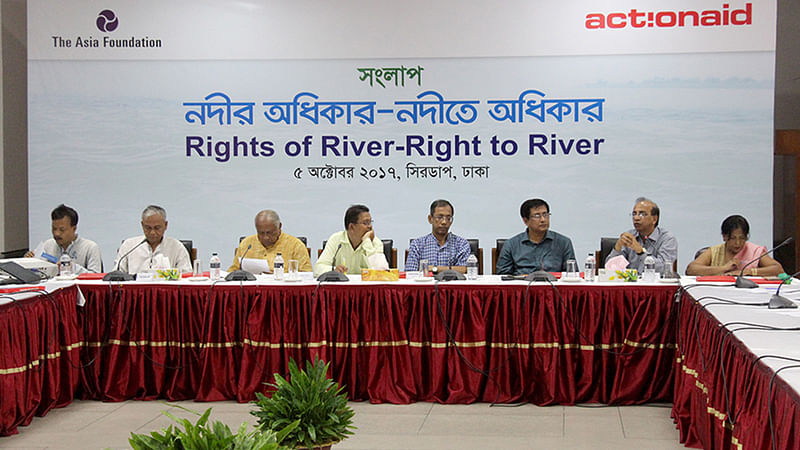'Govt, politicians not serious about river protection'

Adequate measures are not being taken to protect the country's dying rivers despite enhanced public awareness about their importance as lifeline of Bangladesh.
Green activists and water experts came up with the observation at a dialogue on the people's rights and protection of rivers organised by AntionAid Bangladesh at the CIRDAP auditorium in Dhaka on Thursday.
Having more than 50 trans-boundary rivers, Bangladesh cannot secure their uninterrupted flow due to poor water diplomacy, they lamented.
The discussants pointed out, neither the government bodies nor political leaders appreciate rules including court order for saving the rivers.
A High Court order, issued earlier on the authorities concerned to protect rivers, is largely ignored, they regretted.
"There is no specific policy to save rivers," said Abdul Matin, general secretary of Bangladesh Paribesh Andolon (BAPA).
Rezaur Rahman, a professor at the Institute of Water and Flood Management, said, “If we fail to introduce better technology to improve efficiency of using rivers, no river will be alive (in Bangladesh) in course of time.”
He added, despite all destructive activities, the good news is that the people are now more aware about rivers than any time in the past.
In New Zealand and India, rivers have been given rights like living beings. “We need such legal step in our country, as well,” he added.
M Inamul Haque, chairman of the Institute of Water and Environment, said encroachment, pollution, excessive withdrawal and over extraction of waters are all responsible for waning of the rivers.
Professor Anowar Hossain of Mymensingh Agriculture University, said unplanned development is killing the country's rivers.
Sharmeen Murshid, member of the National River Conservation Commission (NRCC), said the commission was formed to save the rivers and ensure 'right to water', but it has now been a ‘toothless institution’.
"No one is taking it seriously," she added.
She observed that Water Development Board doesn’t own the rivers. "It's supposed to be the guardian of the rivers and accordingly the authorities should try to protect the rivers.”
She pointed out that Bangladesh is lagging far behind in its water diplomacy. "The government should take initiative to engage with other partners diplomatically to realise its rights," she suggested.
Hasnat Quayum, a legal expert on river, said, “We all know we have a Water Policy, but that is not enough to protect our rivers. Thus, we need a separate river policy to save the rivers.”
He mentioned that environmental consideration was missing when the subcontinent was divided.
Dwelling on India's so-called River Linking Project, he explained that it is not at all a river linking project. "It’s basically a basin-linking project -- from Himalaya basin to Peninsula basin. And that is totally prohibited (in any international law),” he added.
Fazle Hossain Badsha, general secretary of Workers Party of Bangladesh, said, “I’m against any kind of barrage, even the upcoming Padma Barrage.”
Chittagong University’s professor Monzurul Kibria said, “We should save our rivers to save out biodiversity and environment.”
Manager of the ActionAid Bangladesh, Shamsher Ali said the people’s inhuman acts are killing the rivers. The organisation's director, Asgar Ali Sabri, moderated the dialogue.